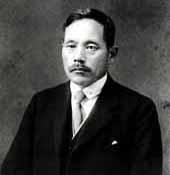Tsunesaburō Makiguchi
| Tsunesaburō Makiguchi | |
|---|---|
 |
|
| 1st President of Sōka Kyōiku Gakkai | |
|
In office 18 November 1930 - 18 November 1944 |
|
| Succeeded by | Jōsei Toda (removed Kyōiku from the organization's name) |
| Personal details | |
| Born | 23 July 1871 (6 June is based on Lunar calendar) Kashiwazaki, Niigata Prefecture, Japan |
| Died | 18 November 1944 (aged 73) Sugamo Prison (present-day Toda Memorial Auditorium), Toshima, Tokyo, Japan |
| Alma mater |
|
| Religion | Nichiren Buddhism |
Tsunesaburō Makiguchi (牧口 常三郎, Makiguchi Tsunesaburō 1871–1944) was a Japanese educator who founded and became the first president of the Sōka Kyōiku Gakkai (Value-Creating Education Society), the predecessor of today's Soka Gakkai.
Makiguchi was born the small village of Kashiwazaki, Niigata Prefecture, Japan, in 23 July 1871 (6 June is based on Lunar calendar). Adopted by the Makiguchi family, he moved to Hokkaido, Japan's northernmost island, at the age of 14. Working his way through school, he graduated from Sapporo Normal School (today's Hokkaido University of Education). First employed as an assistant teacher at a primary school affiliated with his alma mater, he later taught high school and served as a dormitory superintendent.
Although he was recognized as an able teacher, Makiguchi’s uncompromising attitude toward authorities created problems. His clashes with officials of the Ministry of Education, school inspectors, ward assemblymen, city councilmen, and top officials of the city of Tokyo were frequent and resulted in his frequent transfers from one school to another. After moving to Tokyo, he served as principal in a succession of six primary schools, from 1913 to 1932.
During those years, he devoted much consideration to the relationship between life and education, developing his theories on sōka or the creation of value, the happiness of the individual, the prosperity of society at large, and their interrelationships in practice.
Typical of his work is his first book, Jinsei Chirigaku ('A Geography of Human Life'), published in 1903. In it, he developed unique and progressive ideas on the relationship between people's lives and their geographic location. Makiguchi’s work on geography was remarkable in that he was interested primarily in the relationship between nature and man. Japanese geographers of the time were chiefly concerned with describing the physical features of the earth. In Makiguchi’s words, “it is through our spiritual interaction with the earth that the characteristics that we think of as human are ignited and nurtured within us.” In this work, Makiguchi also formulated the concept of humanitarian competition as an approach to international relations, writing that: “The important thing is the setting of a goal of well being and protection of all people, including oneself but not at the increase of self-interest alone. In other words, the aim is the betterment of others and in doing so, one chooses ways that will yield personal benefit as well as benefits to others. It is a conscious effort to create a more harmonious community life.”
...
Wikipedia
